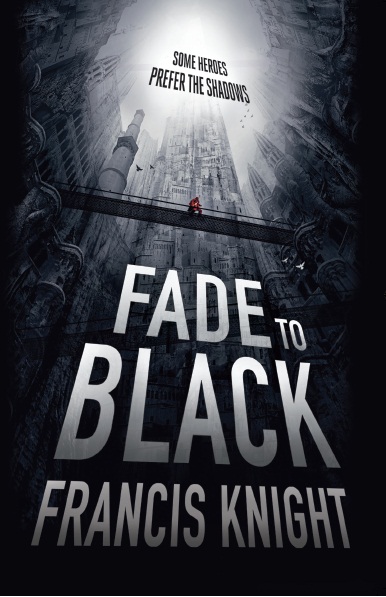Book Review: Fade to Black, by Francis Knight
/
Francis Knight does what so many fantasy authors fail to achieve: create a fantastic world in which to play.
In Fade To Black, pain-mage Rojan Dizon works in the shadows of Mahala, finding people who need to be found, trying to stay a step in front of the law. When his niece is kidnapped and taken to The Pit, Rojan must follow, where he finds that he’s going to be put up against every boundary he has.
The city of Mahala is built up, not out. Bound by mountains on either side, the Mahala is a tall metropolis that shoots into the sky, with a complex, dystopian society run by a ruling elite. Rojan makes his living in this environment, using his forbidden powers sparingly, to avoid detection from the ruling elite. Journeying to the roots of the city, Rojan is in pursuit of his niece, and comes across a world that he never expected, sealed off from the upper levels of the city. There, he encounters Pasha and Jake, a pair of outcasts who have their own agendas that coincide with Rojan’s.
Fade To Black is an engaging, but flawed read. Knight takes a closed, claustrophobic world and spins an interesting story within the walls of Mahala, populated with some solid characters and underlying themes that come together more or less as expected. The book is hard to put down throughout the first half, and while the middle slows considerably, everything flows along pretty well throughout.
The novel works well as a sort of pulp-thriller. A noir-ish detective is pulled into a mystery that grows as the character digs (or in this case, descends) deeper into their surroundings. Knight has set up Mahala as a neat metaphor for overwhelming corruption, and we see firsthand the effects of this when Rojan does go below. Starting with the disappearance of his niece, he uncovers a horrifying truth to the true nature of the city and just what the city’s rulers have allowed under their watch. Overall, while the plot is solid, Rojan and the rest of the characters feel like they’ve being snapped into a rigid framework that leads them through points A, B and C, inorganically. The result is a quite a bit of treading water through some ‘character moments’ that feel like they’re just biding time in at points. A romance between characters is forced at points, and ultimately, what slows the book down is the distraction from Rojan’s main goal: rescue his niece.
Unfortunately, Rojan feels far more out of water than he should: an archtype anti-hero right out of a ’30s detective story, it feels as though he’s further along in his character development than he should be. When he’s in his element in the upper levels of the city, he’s just fine, but as he drops lower into the underside of the city, it’s clear that he’s far more clueless than previously thought. He’s ignorant of the underworld’s entire existence, he flounders around with two companions for much of the middle of the book before going through a sort of internal dialogue about his willingness to use his powers. It’s frustrating, in many ways, because it feels very backward.
This isn’t to say that this is a bad book: far from it. At its heart, Fade To Black is a pulpy, noir-ish adventure, one that is engaging and quite a bit of fun to read. While flawed at points, Knight’s debut work is an unconventional fantasy, one that is a nice departure from the pseudo- Medieval European setting and modern day urban fantasy stories that seem to populate the bookshelves now. With two more books (Before The Fall and Last To Rise)set to be released later this year, readers won’t have long to wait before we’re treated to new adventures in Mahala.
